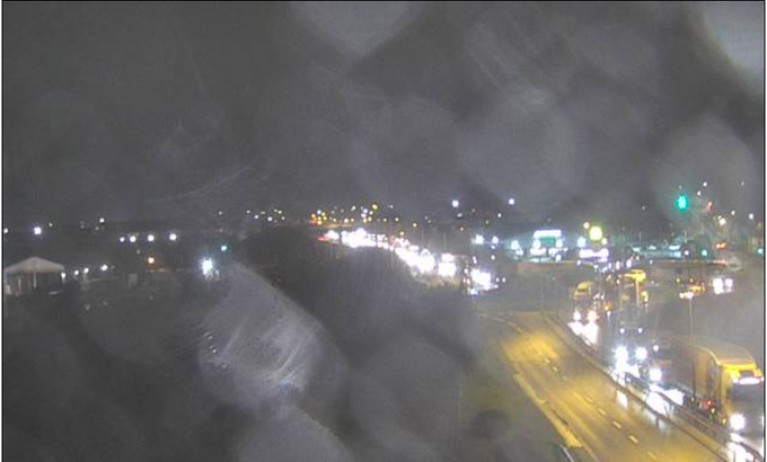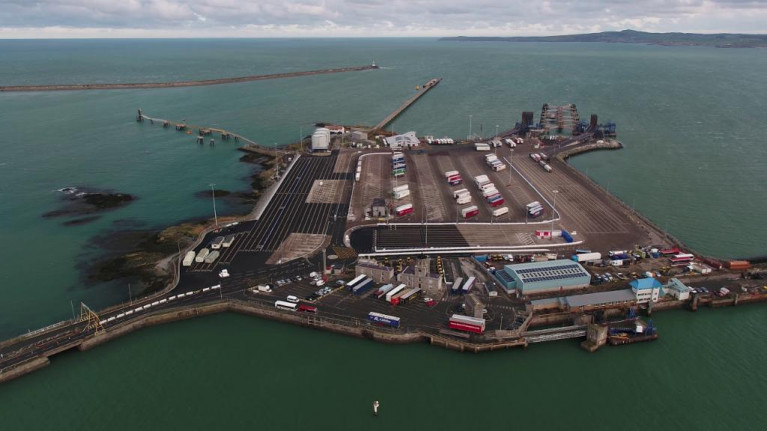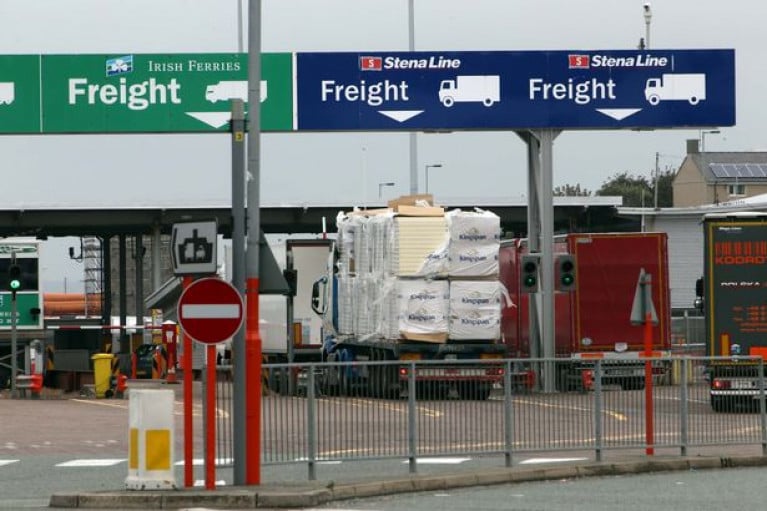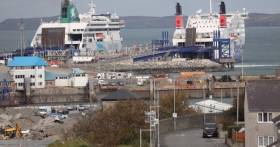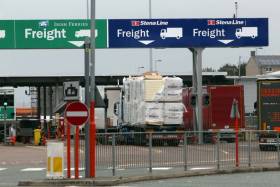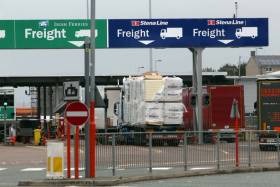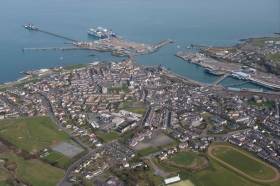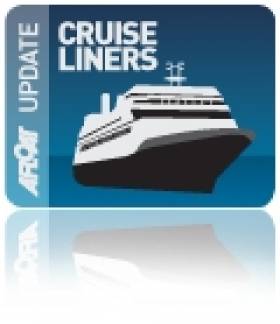Displaying items by tag: Holyhead Port
On a major road leading to Holyhead Port, (ferry) traffic measures have been introduced as the UK prepares to enter its new trading relationship with the EU.
As BBC News writes, the Welsh Government has said the plans are aimed at "minimising any possible disruption to the port, town and wider community".
Freight turned away from the port due to incorrect documentation will be sent on to the westbound A55 (see photo above).
The UK Government has predicted this could be 40-70% of freight.
Holyhead is the second busiest roll-on/roll-off port in the UK, behind only Dover.
Around 600 lorries and trailers leave the Welsh port on ferries bound for Dublin Port every day.
A trade deal between the EU and UK has now been agreed and will take effect from 1 January, but the changes in the trading relationship between the two parties mean there could be some disruption.
The Welsh Government added it expected the peak of traffic issues to be in mid-January.
For further details of traffic stacking management of HGV's click here and much more.
Holyhead Port Plans 'Shambles' Claims First Minister of Wales
In Holyhead there are plans for the ferry port that show "just how shambolic" UK ministers have been on Brexit claimed the First Minister of Wales.
As BBC News reports, Mark Drakeford said the UK government was "in a scramble to resolve" issues around the Anglesey port with one month to go until the transition ends.
It comes as the UK government is in talks to purchase a transport cafe near Holyhead for a customs site.
HM Revenue & Customs (HMRC) said it was planning for the "staged introduction of full border controls in 2021".
The island's Plaid Cymru member of the Senedd (MS) Rhun ap Iorwerth said: "At this eleventh hour we've just seen blind panic."
But the local Conservative MP Virginia Crosbie said the new site would "bring much needed employment to the area".
Land is needed for a potential customs check on HGVs arriving from the Republic of Ireland in Holyhead Port, the UK's second-busiest passenger ferry terminal (Afloat adds after Dover in Kent).
Anglesey council has rejected a request to allow the park-and-ride for the island's showground to be used to host a post-Brexit lorry facility.
Further reading on this story click here.
Government in UK Accused of “Waiting for Holyhead Port to Fail”
In the UK the Government, reports NorthWalesLive, has been accused of “waiting for Holyhead Port to fail before stepping in”, amid a funding row over Irish Sea (ferry) transport links.
Disappointment has been expressed following an announcement on Friday that the Holyhead to Dublin route has been left out of a £17m support package for Stena Line, P&O and Seatruck to maintain “critical routes” between ports in the UK mainland with Northern Ireland.
This was despite calls from local politicians, including the letter of Anglesey Council, who had written to ministers urging financial backing to help bridge the gap due to the drop-off in passenger services during the Covid-19 lockdown.
Answering subsequent criticism of the decision, including from the Welsh Government, a spokesperson for the UK Government said that the the Dublin-Holyhead route is “running effectively” but the situation is being continually monitored.
Further criticism came in the Commons on Monday from Arfon MP Hywel Williams, with the Chancellor failing to offer immediate assurances over financial support for Holyhead Port amidst the Coronavirus pandemic.
For much more on the north Wales ferryport click here.
Admission By UK Government That It Has Not Assessed Impact Brexit Plan On Holyhead Port
The UK Government reports NorthWalesLive, has not considered the impact of Boris Johnson's Brexit plan will have on Holyhead Port, a minister has said.
Michael Gove (who visited the ferryport in August) is the UK Government's Brexit planning minister and he told Welsh Assembly Members that no economic impact assessment had been carried out on how the Prime Minister's plan will impact the port.
In a meeting with the Welsh Assembly's External Affairs Committee, Mr Gove said it was difficult to carry out an assessment on the impact on the UK's second busiest ferryport.
He said: "It’s difficult to have an impact assessment because there are so many variables in play and I always remember the words of the economist JK Galbraith who said that economic forecasting was invented in order to give astrology a good name.”
He argued that Holyhead on Anglesey "will be in a stronger position than ever" if Boris Johnson's new deal is passed by MPs.
A deal has been agreed between the UK and the EU negotiating teams, which experts have said will effectively create a customs border between Great Britain and the island of Ireland.
For further reading click here.
Welsh Port Town of Holyhead on Brexit: ‘When Will People Wake the F**K Up?’
#Ferry- In the Welsh port town of Holyhead, The Irish Times reports, even Santa voted to leave the European Union. Santa’s other name is Richard Burnell. He’s 78 with a long white beard and he formerly worked in local government. This Christmas he will dress in a red suit and give presents to children on the Stena Line ferry.
“I think the idea of the EC [European Community] common market was fine,” says Santa. “But when it got to the stage that they wanted to rule the country, to govern us, I think this is what the people of Britain have kicked up against. We’ve got our own laws which go back hundreds of years.”
‘We were misled. I would change my mind now’
Burnell’s friend Beryl Warner also voted Leave. “In my opinion we were misled,” she says. “I’ve been doing voluntary work all my life, especially in the hospitals … We were told we would have £30 million more for the NHS, and that’s what really prompted me to say leave. I would change my mind now.”
Burnell is more optimistic. “There was a big fishing community in Holyhead, ” he says. “When the EC was formed, it vanished. And when we do get back to Britain we will have our trawling waters back … It’s going to be a challenge, no doubt about it, but it’s a big world out there. We can trade with the rest of the world.”
Do people discuss Brexit? “No,” says Warner. “No. I think that we didn’t know enough about it. We didn’t understand what was happening. Well, I for one didn’t ... Did you get the gist of it all?”
“No,” says Burnell. “There were so many different stories going around, you just had to pick the best bit out of all the stories and hope for the best really.”
Would he still vote the same way? He would, he says. “When you see what’s happening in Europe now, all the immigration and what have you.”
But Santa knows no borders, right? He laughs. “No borders at all. Those reindeers fly under the radar.”
I didn’t want to bring it up, but if there’s a no-deal Brexit next year, Santa and his reindeer will be subject to customs checks along with everyone else. The fear for Welsh politicians – Leavers and Remainers alike – is that, faced with such checks, Holyhead will be swamped by unsustainable traffic jams.
This would lead, they fear, to Irish hauliers going via Northern Ireland to Scotland or from Dublin to ports with larger hinterlands such as Liverpool, or, at worst, bypassing the UK “land bridge” entirely to ship directly to Europe. Holyhead is the second-busiest roll-on, roll-off ferry port in the UK.
About two million passengers, 423,000 lorries and 500,000 tons of cargo pass through each year.
For further comments from local Plaid Cymru councillor, Holyhead Business Forum and calls to bring back duty-free on crossings from Ireland (see related cruise-service bid) and much more, click here.
Clouds from Brexit on Horizon for Holyhead's Lifeline Port
#FerryNews - Trucks in their hundreds roll off the docks at Holyhead every day, bringing goods to and from Ireland in an economic lifeline for this deprived corner of Wales, which is now threatened by Brexit, reports France24.
Just 73 miles (117 kilometres) from the Irish capital Dublin, the port's future will depend on how any Brexit deal affects two borders -- the one between EU member state Ireland and Britain and the one between Northern Ireland and mainland Britain.
The concern for many here is that companies will start finding alternative trade routes for goods travelling between Ireland and continental Europe to avoid Britain after Brexit.
With negotiators still at loggerheads in Brussels ahead of a key EU summit on Wednesday and Thursday, concern about increased checks is already forcing some companies to change tack.
Ray Cole, transport director at Virginia International Logistics, said his company was already using the service from Dublin to Cherbourg in France "whenever we can".
The cost for Holyhead, Britain's second biggest roll-on/roll-off terminal after Dover and an area that voted narrowly to leave the European Union in the 2016 referendum, would be high.
"The problem that we have, it could affect jobs," said Michael Hartnett, a 50-year-old Irish truck driver. Port users had "zero information" about what Brexit deal to expect, he added.
The port sustains 650 jobs directly, according to Carwyn Jones, (First Minister of Wales: see Dun Laoghaire RMS Leinster story) and councillor on the island of Anglesey where Holyhead is located. Jones said the port was "absolutely crucial here to us".
At three-and-a-half hours, the link is the fastest between the Republic of Ireland and Britain, making Holyhead a key hub for major industries such as agri-foods, automobiles and medicine.
To read more including the costs potentially facing Holyhead but also a potential return of ferries operating duty free, click here.
#FerryNews - According to a UK Government minister, there will be no extra customs and security checks at Holyhead port - even in the event of a no-deal Brexit.
The Welsh port writes the Daily Post has lived with the concern that additional border checks would be imposed after Brexit - especially if the UK and EU fail to agree a trade deal.
This has led to warnings about lorry queues on the A55 if the seamless border between the UK and Ireland is disrupted - with little room at the port for additional customs checks.
But Brexit minister Chris Heaton-Harris came to the port this week to give "reassurance" to ferry giants Stena Line and Irish Ferries that no extra barriers to travel and trade will be erected on the UK side after Brexit - even if no deal is agreed.
The Daily Post has more here on the story.
#GiantFerries - The world’s largest ferry which is to arrive on a Dublin to continental Europe route writes The Daily Post has sparked post Brexit fears over trade at Holyhead port.
The 234m ro-ro freight ferry Celine as reported on Afloat.ie is being introduced on an Ireland to Belgium/Dutch route by cargo group CLdN - increasing capacity on that service.
There are concerns this is part of a wider trend to hike up capacity on routes to and from Ireland that by-pass the UK to avoid potential tariffs and customs delays after Brexit.
A new ferry is to introduced between Holyhead and Dublin next summer. Afloat adds this is Irish Ferries giant cruiseferry WB Yeats which as the biggest ferry on the Irish Sea will considerably boost capacity notably also on another continetal route to Europe that been between Dublin and Cherbourg.
Port bosses at Cork have already said they expect to see a “reorientation of logistics” post.
This would be bad news for Holyhead - the second largest ferry port in the UK after Dover - with the risk that trade is lost to these routes.
Anglesey MP Albert Owen said he has been raising this issue for months but fears the message is not getting through.
For much more on the ferry sector including political comments from both sides of the Irish Sea, click here.
#ProposedCruiseDock- Calls on the Welsh Government to help develop a purpose built cruise ship dock at Holyhead on Anglesey amid concerns that the region could be missing out on valuable tourism cash.
The Daily Post which has more on the storey reports that the proposed development comes weeks after a vessel carrying 2,500 passengers failed to dock at the former Anglesey Aluminium jetty because it isn't suitable for use in high winds.
The Celebrity Silhouette (which called first to Dun Laoghaire on 14 June) was the largest vessel due at the Anglesey port this summer - one of more than 20 cruise ships coming to the island.
Anglesey AM Rhun ap Iorwerth expressed his disappointment that the island, and North Wales as a whole, missed out on thousands of pounds which would have been pumped into the local economy and has now called on the Welsh Government to intervene.
As reported today on Afloat.ie, the Dun Laoghaire Harbour Company on behalf of Dun Laoghaire Cruise Stakeholder Group will tomorrow (Friday 3rd July) submit its planning application for a new cruise berth facility at the Irish harbour to An Bord Pleanála


























